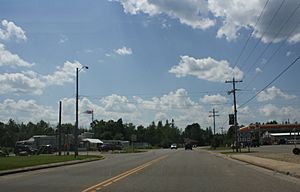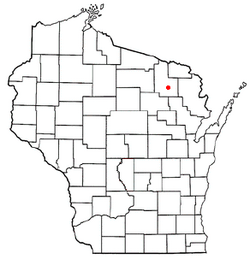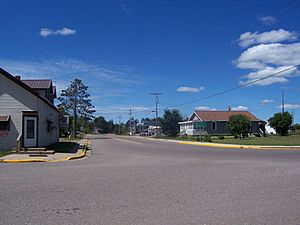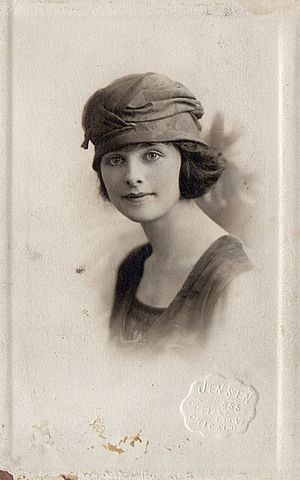Laona (CDP), Wisconsin facts for kids
Quick facts for kids
Laona, Wisconsin
|
|
|---|---|

Looking west in downtown Laona
|
|

Location of Laona, Wisconsin
|
|
| Country | United States |
| State | Wisconsin |
| County | Forest |
| Government | |
| • Type | unincorporated |
| Area | |
| • Total | 1.948 sq mi (5.05 km2) |
| • Land | 1.948 sq mi (5.05 km2) |
| • Water | 0 sq mi (0 km2) |
| Elevation | 1,572 ft (479 m) |
| Population
(2020)
|
|
| • Total | 519 |
| • Density | 266.4/sq mi (102.87/km2) |
| Time zone | UTC-6 (Central (CST)) |
| • Summer (DST) | UTC-5 (CDT) |
| Area code(s) | 715 & 534 |
| FIPS code | 55-42500 |
| GNIS feature ID | 1583528 |
Laona is a small community located in Forest County, Wisconsin, United States. It's known as a census-designated place, which means it's a specific area identified for population counting.
You can find Laona by following U.S. Route 8, which runs east to west through the community. Wisconsin Highway 32 also passes nearby. A special fact about Laona is that its community park has a sign saying they donated the 1979 Christmas tree for the nation's capitol building. In 2020, about 519 people lived in Laona.
Contents
History of Laona
The community of Laona officially started in 1903. However, people began settling here earlier, around 1896. A man named William D. Connor, who was a lumberman, helped start the area. He was the president of his company, R. Connor Lumber and Land Company.
Laona was named after the daughter of an early resident, Norman Johnson. She was the first child born to a settler in the area.
In 1896, W.D. Connor explored this region. He traveled about 60 miles from Gillett, Wisconsin, looking for good places for mills and towns. He found several spots, and two of them became Wabeno, Wisconsin and Laona. Connor eventually bought over 100,000 acres (40,000 ha) of land around Laona.
The Laona area was once home to the Potawatomi and Chippewa Native American tribes. They held annual porcupine hunts in the summer. People from all over Northern Wisconsin and Upper Michigan would gather for days of hunting, cooking, and dancing. They also had fall festivals to celebrate the wild rice harvest. What is now Laona's main street used to have a long brush fence. This was a deer hunting area where Native Americans would wait with bows for deer drives.
Laona was a classic company town. This means that the Connor company built almost everything. They built the town's mill, bank, hospital, store, school, and even houses. The town's economy mainly depended on the company's lumber mill. Sometimes, during tough economic times, the company would even issue its own special money, called "company scrip", for people to use in town.
Today, Laona is still an important part of Wisconsin's lumber history. The private forests around the town have been carefully managed for over 100 years. This shows how forests can be used sustainably, meaning they are used in a way that protects them for the future.
Local Businesses
Laona is home to some big businesses that focus on wood products.
Nicolet Hardwoods Corporation
Nicolet Hardwoods Corporation is one of the largest hardwood sawmills in the Midwest. They use very advanced technology to process wood. They are proud to say that they have zero waste from their sawmill. This means they use every part of the wood, which is great for the environment!
W•D Flooring, LLC
W•D Flooring, LLC is the biggest flooring mill in the region. They make flooring for homes and businesses. They even make special flooring for gymnasiums and sports courts. Their flooring has been used in famous places like the Country Music Hall of Fame in Nashville and the Detroit Institute of Arts. Like Nicolet Hardwoods, W•D Flooring also aims for zero waste in their production.
Fun Things to Do
Laona offers some exciting activities, especially for those who love history and the outdoors.
Lumberjack Steam Train
During the summer, you can visit the Lumberjack Steam Train. This is a real, working passenger train from the early 1900s. It also has an award-winning museum. It's a great way to experience what train travel was like a long time ago!
Snowmobiling Adventures
In the winter, Laona is a popular spot for snowmobiling. It's home to the "100 Mile Snow Safari," also called the "100 miler." This is one of Wisconsin's oldest snowmobiling trails. It offers nearly 100 miles (160 km) of trails through undeveloped areas. You can ride through many lakes and timberland, making it a favorite trail for snowmobile riders.
Images for kids
-
Town's hall in the unincorporated community
See also
 In Spanish: Laona (condado de Forest) para niños
In Spanish: Laona (condado de Forest) para niños
 | Ernest Everett Just |
 | Mary Jackson |
 | Emmett Chappelle |
 | Marie Maynard Daly |








